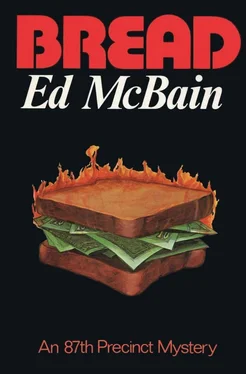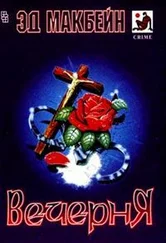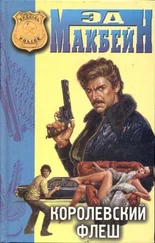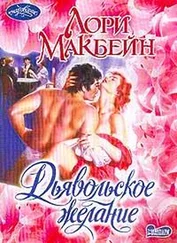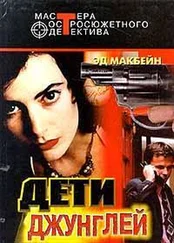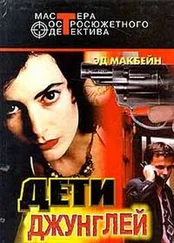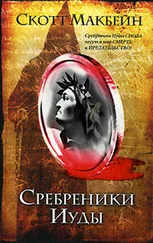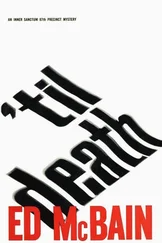“No,” Carella said flatly.
Jamie Holder came into the room. He was as big as Hawes remembered him, with powerful wrists and huge hands. “What’s the static, man?” he asked.
“They’ve made a mistake, Holder,” Avery said.
“Oh, sure,” Holder said.
The Ancient Skulls were not all as old as their title proclaimed, but they nonetheless ranged in age from eighteen to twenty-six, which meant that they were not juvenile offenders and could therefore be questioned in a police station. Nobody had ever told the cops in this city exactly where a juvenile offender should be interrogated. Usually, they took any suspect juvenile to a part of the building that was not contaminated by various and sundry sordid types, thereby giving lip service to the ruling — strange are the ways of the Law. The Ancient Skulls, of course, were entitled to a recitation and explanation of their rights, and they were entitled to maintain silence if they so chose, and they were also entitled to legal counsel whether or not they decided to answer any questions. Miranda-Escobedo, the Supreme Court decision that granted all these rights, was not the hindrance some police officers claimed it to be. In fact, a survey among law-enforcement officers around the country had revealed that as many confessions had been obtained since the Miranda-Escobedo decision as before, without the use of backroom, third-degree techniques.
Avery Evans, the leader of The Ancient Skulls, was the oldest member of the gang, twenty-six going on twenty-seven. He was also the smartest, and presumably the toughest. He maintained that the police were making some kind of mistake, and he said he would freely answer any and all questions they asked him. He had nothing to hide. The Ancient Skulls had always cooperated with the police, and he was certainly willing to cooperate with them now. He advised the other members of the gang — or at least those members present, it being estimated that there were a hundred and twelve Ancient Skulls residing in Isola and another fifty-some-odd in Riverhead — that they, likewise, could answer any questions the cops put to them. Avery Evans was cool, smart, tough, supremely confident, and the leader of a proud and noble band. He did not know, of course, that the police had a tape recording of what he and his proud and noble followers had done to Elizabeth Benjamin.
“You still haven’t told me what this is all about, man,” he said.
He was sitting in the Interrogation Room at the 83rd, at a long table facing a one-way mirror, sometimes called a two-way mirror — stranger and stranger are the ways of the Law. Those cops who called it a one-way mirror did so on the grounds that it only reflected on one side, whereas the other side was a clear pane of glass through which you could observe the person looking into the mirror. One way you looked into it, one way you looked through it — hence a one-way mirror. But there were other cops who called it a two-way mirror because of its double role as looking glass and glass for looking. You could not reasonably expect cops, who couldn’t even agree on the interpretation of Miranda-Escobedo after all these years, to agree on what the hell to call a one-way-two-way mirror. The important thing was that any suspect looking into the mirror, which hung conspicuously on the wall of the otherwise bare-walled Interrogation Room, knew immediately that he was looking into a trick mirror and (nine times out of ten) being photographed through it from the adjacent room. Which is just what was happening to Avery Evans, with his complete knowledge. But, of course, he had nothing to hide. He was convinced the cops had nothing on him. Let them take his picture through their phony mirror, let them run through all the nonsense. In half an hour he’d be back dancing at the old clubhouse.
Ollie — who was running the interrogation, since this was his corral, so to speak, even though it differed only slightly in decrepitude from the squadroom of the 87th — immediately said, “Before we start, let me make sure again that you understand your rights as we explained them to you, and that you’re willing to answer questions without a lawyer here. Is that right?”
“Oh, sure, sure,” Avery said. “I got nothing to hide, man.”
“Okay, then, you want to give me your full name?”
“Avery Moses Evans.”
“Where do you live, Ave?”
“On Ainsley Avenue — 1194 Ainsley, Apartment 32.”
“Live alone?”
“I live with my mother.”
“What’s her name?”
“Eloise Evans.”
“Father living?”
“They’re separated,” Avery said.
“Where were you born, Ave?”
“Right here. This city.”
“How old are you?”
“I’ll be twenty-seven two days before Christmas.”
“Where do you work?”
“I am at present unemployed.”
“Are you a member of the gang called The Ancient Skulls?”
“It’s a club,” Avery said.
“Sure. Are you a member?”
“I’m the president,” Avery said.
“Is Jamie Holder a member?”
“Jamison Holder, that’s right. Good man,” Avery said, and grinned.
“Where were you and Jamie Holder tonight between five and five-thirty P.M.?”
“I don’t remember exactly.”
“Try to remember exactly,” Ollie said.
“Hanging around.”
“Hanging around where?”
“Probably shooting pool.”
“Where would that have been?”
“Ace Billiards. On Kruger Street.”
“Anybody see you and Jamie there at that time?”
“Lots of guys from the Skulls were there.”
“Anybody besides members of your gang?”
“Club.”
“Anybody besides them?”
“I couldn’t say for sure. I don’t make a habit of finding out who’s in a place.”
“Know anybody named Charlie Harrod?” Ollie asked, and tweaked his nose with his thumb and forefinger. This was the signal to begin a flanking attack, Ollie continuing the frontal assault while Carella and Hawes closed in from either side.
“Never heard of him,” Avery said.
“Elizabeth Benjamin?” Hawes asked. “Ever hear of her?”
“Nope.”
“Harrod was a junkie,” Carella said.
“Yeah?” Avery said, and smiled. “I notice you used the past tense, man. Did he kick the habit?”
“Yes, he kicked it,” Hawes said.
“Good for him. We got no junkies in our club. I think you guys already know that. Ask any of the cops up here, they’ll tell you the Skulls are clean.”
“Oh yeah, we know that,” Ollie said.
“It’s a fact, man.”
“But you never heard of Harrod, huh?”
“Nope. All I know is if he kicked the habit, I’m proud of him. Too much junk in this neighborhood. That’s one thing you got to say about the Skulls, we’re doing our share to make this neighborhood a better place to live in.”
“Oh, ain’t we all,” Ollie said, doing his now-famous W. C. Fields imitation, “ain’t we all.”
“And another thing,” Avery said, “it’s the Skulls, and only the Skulls, who’re always negotiating with the other clubs to keep the peace around here. If it wasn’t for us, you guys would have your hands full. There’d be war all the goddamn time. I think you owe us at least a little gratitude for that.”
“Oh, sure we do,” Ollie said.
None of the cops bothered to mention that if there were no street gangs, there would be no wars, and therefore no need for any of the gangs to negotiate for peace. Each of the men questioning Avery knew that today’s gangs were far more dangerous than those existing twenty years ago, mainly because the current version came fully equipped with an ideology. The ideology provided a built-in justification for mayhem. If you’re doing something because it’s helping the neighborhood, why then, you can do any damn thing you like. Moreover, you can do it with a sense of pride.
Читать дальше
